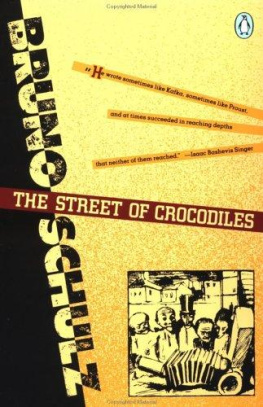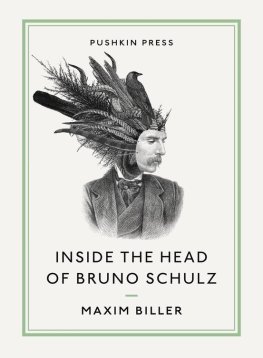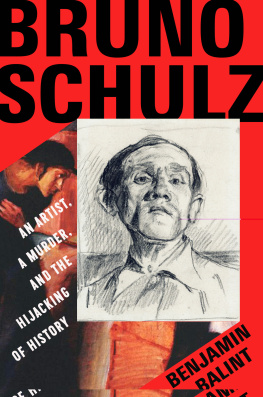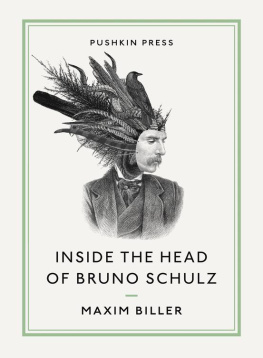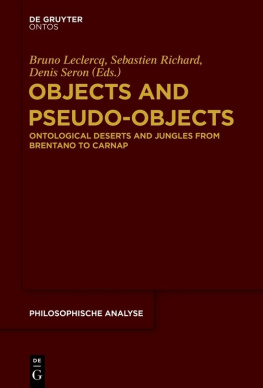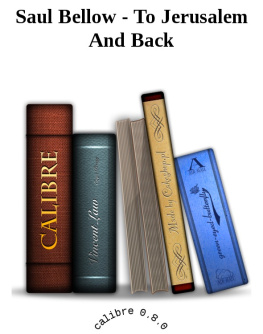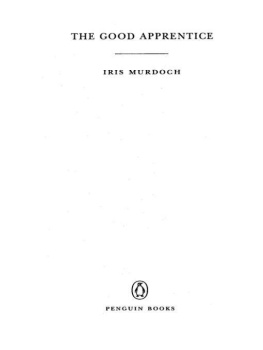Bruno Schulz - The Street of Crocodiles (Classic, 20th-Century, Penguin)
Here you can read online Bruno Schulz - The Street of Crocodiles (Classic, 20th-Century, Penguin) full text of the book (entire story) in english for free. Download pdf and epub, get meaning, cover and reviews about this ebook. year: 1992, publisher: Penguin Classics, genre: Detective and thriller. Description of the work, (preface) as well as reviews are available. Best literature library LitArk.com created for fans of good reading and offers a wide selection of genres:
Romance novel
Science fiction
Adventure
Detective
Science
History
Home and family
Prose
Art
Politics
Computer
Non-fiction
Religion
Business
Children
Humor
Choose a favorite category and find really read worthwhile books. Enjoy immersion in the world of imagination, feel the emotions of the characters or learn something new for yourself, make an fascinating discovery.
- Book:The Street of Crocodiles (Classic, 20th-Century, Penguin)
- Author:
- Publisher:Penguin Classics
- Genre:
- Year:1992
- Rating:3 / 5
- Favourites:Add to favourites
- Your mark:
- 60
- 1
- 2
- 3
- 4
- 5
The Street of Crocodiles (Classic, 20th-Century, Penguin): summary, description and annotation
We offer to read an annotation, description, summary or preface (depends on what the author of the book "The Street of Crocodiles (Classic, 20th-Century, Penguin)" wrote himself). If you haven't found the necessary information about the book — write in the comments, we will try to find it.
Bruno Schulz: author's other books
Who wrote The Street of Crocodiles (Classic, 20th-Century, Penguin)? Find out the surname, the name of the author of the book and a list of all author's works by series.
The Street of Crocodiles (Classic, 20th-Century, Penguin) — read online for free the complete book (whole text) full work
Below is the text of the book, divided by pages. System saving the place of the last page read, allows you to conveniently read the book "The Street of Crocodiles (Classic, 20th-Century, Penguin)" online for free, without having to search again every time where you left off. Put a bookmark, and you can go to the page where you finished reading at any time.
Font size:
Interval:
Bookmark:
August
1
In July my father went to take the waters and left me, with my mother and elder brother, a prey to the blinding white heat of the summer days. Dizzy with light, we dipped into that enormous book of holidays, its pages blazing with sunshine and scented with the sweet melting pulp of golden pears.
On those luminous mornings Adela returned from the market, like Pomona emerging from the flames of day, spilling from her basket the colorful beauty of the sun the shiny pink cherries full of juice under their transparent skins, the mysterious black morellos that smelled so much better than they tasted; apricots in whose golden pulp lay the core of long afternoons. And next to that pure poetry of fruit, she unloaded sides of meat with their keyboard of ribs swollen with energy and strength, and seaweeds of vegetables like dead octopuses and squidsthe raw material of meals with a yet undefined taste, the vegetative and terrestrial ingredients of dinner, exuding a wild and rustic smell.
The dark second-floor apartment of the house in Market Square was shot through each day by the naked heat of summer: the silence of the shimmering streaks of air, the squares of brightness dreaming their intense dreams on the floor; the sound of a barrel organ rising from the deepest golden vein of day; two or three bars of a chorus, played on a distant piano over and over again, melting in the sun on the white pavement, lost in the fire of high noon.
After tidying up, Adela would plunge the rooms into semidarkness by drawing down the linen blinds. All colors immediately fell an octave lower, the room filled with shadows, as if it had sunk to the bottom of the sea and the light was reflected in mirrors of green waterand the heat of the day began to breathe on the blinds as they stirred slightly in their daydreams.
On Saturday afternoons I used to go for a walk with my mother. From the dusk of the hallway, we stepped at once into the brightness of the day. The passers-by, bathed in melting gold, had their eyes half closed against the glare, as if they were drenched with honey. Upper lips were drawn back, exposing the teeth. Everyone in this golden day wore that grimace of heatas if the sun had forced his worshipers to wear identical masks of gold. The old and the young, women and children, greeted each other with these masks, painted on their faces with thick gold paint; they smiled at each other's pagan facesthe barbaric smiles of Bacchus.
Market Square was empty and white-hot, swept by hot winds like a biblical desert. The thorny acacias, growing in this emptiness, looked with their bright leaves like the trees on old tapestries. Although there was no breath of wind, they rustled their foliage in a theatrical gesture, as if wanting to display the elegance of the silver lining of their leaves that resembled the fox-fur lining of a nobleman's coat. The old houses, worn smooth by the winds of innumerable days, played tricks with the reflections of the atmosphere, with echoes and memories of colors scattered in the depth of the cloudless sky. It seemed as if whole generations of summer days, like patient stonemasons cleaning the mildewed plaster from old faades, had removed the deceptive varnish, revealing more and more clearly the true face of the houses, the features that fate had given them and life had shaped for them from the inside. Now the windows, blinded by the glare of the empty square, had fallen asleep; the balconies declared their emptiness to heaven; the open doorways smelt of coolness and wine.
A bunch of ragamuffins, sheltering in a corner of the square from the flaming broom of the heat, beleaguered a piece of wall, throwing buttons and coins at it over and over again, as if wishing to read in the horoscope of those metal discs the real secret written in the hieroglyphics of cracks and scratched lines. Apart from them, the square was deserted. One expected that, any minute, the Samaritan's donkey, led by the bridle, would stop in front of the wine merchant's vaulted doorway and that two servants would carefully ease a sick man from the red-hot saddle and carry him slowly up the cool stairs to the floor above, already redolent of the Sabbath.
Thus my mother and I ambled along the two sunny sides of Market Square, guiding our broken shadows along the houses as over a keyboard. Under our soft steps the squares of the paving stones slowly filed pastsome the pale pink of human skin, some golden, some blue-gray, all flat, warm and velvety in the sun, like sundials, trodden to the point of obliteration, into blessed nothingness.
And finally on the corner of Stryjska Street we passed within the shadow of the chemist's shop. A large jar of raspberry juice in the wide window symbolized the coolness of balms which can relieve all kinds of pain. After we passed a few more houses, the street ceased to maintain any pretense of urbanity, like a man returning to his little village who, piece by piece, strips off his Sunday best, slowly changing back into a peasant as he gets closer to his home.
The suburban houses were sinking, windows and all, into the exuberant tangle of blossom in their little gardens. Overlooked by the light of day, weeds and wild flowers of all kinds luxuriated quietly, glad of the interval for dreams beyond the margin of time on the borders of an endless day. An enormous sunflower, lifted on a powerful stem and suffering from hypertrophy, clad in the yellow mourning of the last sorrowful days of its life, bent under the weight of its monstrous girth. But the nave, suburban bluebells and unpretentious dimity flowers stood helpless in their starched pink and white shifts, indifferent to the sunflower's tragedy.
A tangled thicket of grasses, weeds, and thistles crackled in the fire of the afternoon. The sleeping garden was resonant with flies. The golden field of stubble shouted in the sun like a tawny cloud of locusts; in the thick rain of fire the crickets screamed; seed pods exploded softly like grasshoppers. And over by the fence the sheepskin of grass lifted in a hump, as if the garden had turned over in its sleep, its broad, peasant back rising and falling as it breathed on the stillness of the earth. There the untidy, feminine ripeness of August had expanded into enormous, impenetrable clumps of burdocks spreading their sheets of leafy tin, their luxuriant tongues of fleshy greenery. There, those protuberant bur clumps spread themselves, like resting peasant women, half-enveloped in their own swirling skirts. There, the garden offered free of charge the cheapest fruits of wild lilac, the heady aquavit of mint and all kinds of August trash. But on the other side of the fence, behind that jungle of summer in which the stupidity of weeds reigned unchecked, there was a rubbish heap on which thistles grew in wild profusion. No one knew that there, on that refuse dump, the month of August had chosen to hold that year its pagan orgies. There, pushed against the fence and hidden by the elders, stood the bed of the half-wit girl, Touya, as we all called her. On a heap of discarded junk of old saucepans, abandoned single shoes, and chunks of plaster, stood a bed, painted green, propped up on two bricks where one leg was missing.
The air over that midden, wild with the heat, cut through by the lightning of shiny horseflies, driven mad by the sun, crackled, as if filled with invisible rattles, exciting one to frenzy.
Touya sits hunched up among the yellow bedding and odd rags, her large head covered by a mop of tangled black hair. Her face works like the bellows of an accordion. Every now and then a sorrowful grimace folds it into a thousand vertical pleats, but astonishment soon straightens it out again, ironing out the folds, revealing the chinks of small eyes and damp gums with yellow teeth under snoutlike, fleshy lips. Hours pass, filled with heat and boredom; Touya chatters in a monotone, dozes, mumbles softly, and coughs. Her immobile frame is covered by a thick cloak of flies. But suddenly the whole heap of dirty rags begins to move, as if stirred by the scratching of a litter of newborn rats. The flies wake up in fright and rise in a huge, furiously buzzing cloud, filled with colored light reflected from the sun. And while the rags slip to the ground and spread out over the rubbish heap, like frightened rats, a form emerges and reveals itself: the dark half-naked idiot girl rises slowly to her feet and stands like a pagan idol, on short childish legs; her neck swells with anger, and from her face, red with fury, on which the arabesques of bulging veins stand out as in a primitive painting, comes forth a hoarse animal scream, originating deep in the lungs hidden in that half-animal, half-divine breast. The sun-dried thistles shout, the plantains swell and boast their shameless flesh, the weeds salivate with glistening poison, and the half-wit girl, hoarse with shouting, convulsed with madness, presses her fleshy belly in an access of lust against the trunk of an elder, which groans softly under the insistent pressure of that libidinous passion, incited by the whole ghastly chorus to hideous unnatural fertility.
Font size:
Interval:
Bookmark:
Similar books «The Street of Crocodiles (Classic, 20th-Century, Penguin)»
Look at similar books to The Street of Crocodiles (Classic, 20th-Century, Penguin). We have selected literature similar in name and meaning in the hope of providing readers with more options to find new, interesting, not yet read works.
Discussion, reviews of the book The Street of Crocodiles (Classic, 20th-Century, Penguin) and just readers' own opinions. Leave your comments, write what you think about the work, its meaning or the main characters. Specify what exactly you liked and what you didn't like, and why you think so.

